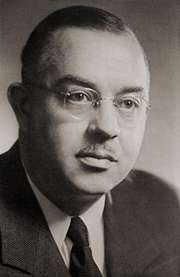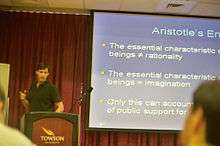F. A. Harper
Floyd Arthur "Baldy" Harper (February 7, 1905 – April 1973) was an American academic, economist and writer who was best known for founding the Institute for Humane Studies in 1961.[1][4]
F. A. Harper | |
|---|---|
 | |
| Born | February 7, 1905[1] |
| Died | April 21, 1973[2] |
| Nationality | United States |
| School or tradition | Austrian School |
| Influences | Herbert J. Davenport[3] |
Personal life
Baldy Harper was born and raised in Middleville, Michigan and graduated from Michigan State University.[1][5] He went on to obtain a doctorate in agricultural economics from Cornell University.[3] Economist Herbert J. Davenport was influential to Harper during his time at Cornell.[3]
In 1930, Harper married Marguerite Kaechele. The couple had four children: Barbara, Harriet, Helen, and Larry.
Career
The Federal Farm Board employed Harper as a research field agent in 1930 and 1931. He worked as a business analyst for the Farm Credit Association in 1934.[6] In academia Harper spent 19 years as a professor of marketing at Cornell University and in 1937 was appointed acting head of the Department of Agricultural economics at the University of Puerto Rico. He left Cornell in 1946 after university officials decided that he should not be assigning readings of Austrian economist Friedrich Hayek's work.[1][7] In 1946, Harper helped Leonard Read start the Foundation for Economic Education.[1][8] A member of the Mont Pelerin Society, Harper was present at the group's first meeting in 1947 along with Friedrich Hayek, Ludwig Von Mises, Milton Friedman, and Karl Popper.[1][9] Harper served on the staff of the Foundation for Economic Education until 1958, when he became a co-director of the William Volker Fund, a position he held until 1961.[10] In the early 1960s, Harper served as a visiting professor of moral philosophy at Wabash College.[1][11] Harper is best known for founding the Institute for Humane Studies.[12] Initially he served as the Institute's secretary and treasurer. In 1965 he became the Institute's president, a position he held until his death in 1973.[13]
Institute for Humane Studies

Harper founded the Institute for Humane Studies in 1961 in Menlo Park, California.[14] The Institute, which began in Harper's garage, is a non-profit organization that offers educational and career programs.[1][15][16] The educational programs include seminars, scholarships to undergraduate and graduate students, an archive of recorded lectures, and an interactive website based on a multi-axis model of political thought.[17] The career assistance programs include paid internships for students and recent graduates, a networking website for classical liberal academics, and recognition of alumni accomplishments.[18] Initially serving as the secretary and treasurer, Harper became the Institute's president in 1966, a position he held until his death in 1973.[3] After beginning an association with George Mason University, Leonard Liggio, Walter Grinder, and John Blundell moved the institute to Fairfax, Virginia in 1985.[19] The organization is currently located at 3434 Washington Blvd. on the George Mason University Arlington campus.[20]
Legacy
Mentoring a network of classical liberal scholars, building institutions, encouraging scholarship, and laying out strategy and practice for the libertarian movement is where Harper's influence is visible today.[1][21] Current Institute for Humane Studies chairman of the board Charles Koch said that Harper's book, Why Wages Rise, influenced his philosophical framework.[22] In 1978 and 1979 the Institute for Humane Studies published The Writings of F. A. Harper.[23] Koch wrote the tribute section, saying, "Of all the teachers of liberty, none was as well-beloved as Baldy, for it was he who taught the teachers and, in teaching, taught them humility and gentleness."[23]
The Mercatus Center at George Mason University established the F.A. Harper Professorship in Economics, a position currently held by Christopher Coyne.[24] In October 2011, Coyne co-authored an article entitled War and Liberty: Wisdom From Leonard E. Read and F. A. 'Baldy' Harper. The article reviews the main themes of Harper's anti-war pamphlet In Search of Peace and argues that Harper's ideas are as important and relevant today as they were in 1950.[25]
Works

- Harper, F A; C W Vaughn (November 1927). "Machines for Handling Statistics". American Mathematical Monthly. 34 (9): 446–53. JSTOR 2300220.
- Harper, F A (1939). Reasons for Differences in the Price of Apples Received by Ulster County Growers, 1937 Crop ... Ithaca, New York: Dept. of Agricultural Economics and Farm Management Cornell University.
- Harper, F A (May 1, 1937). "Using Economic Information in Building an Annual Farm Program: Discussion". Journal of Farm Economics. 19 (2): 422–24. doi:10.2307/1230944. ISSN 1071-1031. JSTOR 1230944.
- Harper, F A; F F Hill (May 1944). "Have We Food Enough for All?". American Journal of Nursing. 44 (5): 523. doi:10.1097/00000446-194405000-00060.
- Harper, F A (November 1, 1944). "The Importance of Storage Costs in Accumulating Food Stocks". Journal of Farm Economics. 26 (4): 794–800. doi:10.2307/1232125. ISSN 1071-1031. JSTOR 1232125.
- Harper, F A; Pearson, Frank (1945). The World's Hunger. Ithaca, New York: Cornell University Press. p. 90.
- Harper, F A (May 1, 1948). "The Government's Agricultural Policy and Inflation". Proceedings of the Academy of Political Science. 23 (1): 30–36. doi:10.2307/1172885. ISSN 0065-0684. JSTOR 1172885.
- Harper, F A (1948). High Prices. Irvington, New York: Foundation for Economic Education. p. 71.
- Harper, F A (1949). Liberty, A Path to Its Recovery. Foundation for Economic Education. ISBN 978-0-910614-95-5. Archived from the original on September 1, 2012. Retrieved November 18, 2011.
- Harper, F A (1957). Why Wages Rise. Foundation for Economic Education. ISBN 978-0-910614-05-4. Archived from the original on November 4, 2011. Retrieved September 13, 2014.
- Harper, F A (July 19, 1968). "Federal Funds Mean Federal Control". Science. 161 (3838): 220. Bibcode:1968Sci...161..220H. doi:10.1126/science.161.3838.220. PMID 5657323. Retrieved January 14, 2012.
- Harper, F A (1969). The Crisis of the Free Market. Chicago: Johnson. p. 83. ISBN 9784829112151.
- Harper, F A (1979). The Writings of F A Harper. Arlington, Virginia: Institute for Humane Studies. ISBN 978-0-89617-000-1. v1 v2
- Harper, F A (1931). F. A. Harper Papers. Stanford, California: Hoover Institution Archives.
References
- Wilkinson, Will (2008). "Harper, Floyd Arthur "Baldy" (1905–1973)". In Hamowy, Ronald (ed.). Harper, Floyd Arthur 'Baldy' (1905–1973). The Encyclopedia of Libertarianism. Thousand Oaks, CA: SAGE; Cato Institute. pp. 217–18. doi:10.4135/9781412965811.n130. ISBN 978-1-4129-6580-4. LCCN 2008009151. OCLC 750831024.
- Rothbard, Murray N (August 17, 2007). "Floyd Arthur 'Baldy' Harper, RIP". Mises Daily.
- Poirot, Paul L (August 1979). "The Writings of F. A. Harper". The Freeman. 29 (8). Archived from the original on September 12, 2011. Retrieved January 11, 2012.
- Wilcox, Derk Arend (2000). The Right Guide: A Guide to Conservative, Free-Market, and Right-of-Center Organizations. Ann Arbor, MI: Economics America, Inc. p. 440. ISBN 978-0-914169-06-2.Huebert, Jacob H (2010). Libertarianism Today. Santa Barbara, California: ABC-CLIO. p. 254. ISBN 978-0-313-37754-9.Hülsmann, Jörg Guido (September 28, 2007). "Birth of a Movement". Mises Daily. Ludwig von Mises Institute. Retrieved October 10, 2011.Mirowski, Philip; Plehwe, Dieter (2009). The Road from Mont Pèlerin: The Making of the Neoliberal Thought Collective. Cambridge: Harvard University Press. p. 469. ISBN 978-0-674-03318-4.Rothbard, Murray Newton (1977). Power and Market: Government and the Economy. Sheed Andrews and McMeel. ISBN 9780836207507.
- Wilcox, Derk Arend (2000). The Right Guide: A Guide to Conservative, Free-Market, and Right-of-Center Organizations. Ann Arbor, MI: Economics America, Inc. p. 440. ISBN 978-0-914169-06-2.Huebert, Jacob H (2010). Libertarianism Today. Santa Barbara, California: ABC-CLIO. p. 254. ISBN 978-0-313-37754-9.Hülsmann, Jörg Guido (September 28, 2007). "Birth of a Movement". Mises Daily. Ludwig von Mises Institute. Retrieved October 10, 2011.Mirowski, Philip; Plehwe, Dieter (2009). The Road from Mont Pèlerin: The Making of the Neoliberal Thought Collective. Cambridge: Harvard University Press. p. 469. ISBN 978-0-674-03318-4.
- Sennholz, Mary (1956). On Freedom and Free Enterprise: Essays in Honor of Ludwig Von Mises. Ludwig von Mises Institute. ISBN 978-1-61016-119-0.
- Sennholz, Mary (1956). On Freedom and Free Enterprise: Essays in Honor of Ludwig Von Mises. Ludwig von Mises Institute. ISBN 978-1-61016-119-0. Poirot, Paul L (August 1979). "The Writings of F. A. Harper". The Freeman. 29 (8). Archived from the original on September 12, 2011. Retrieved January 11, 2012.Sennholz, Mary (1956). On Freedom and Free Enterprise: Essays in Honor of Ludwig Von Mises. Ludwig von Mises Institute. ISBN 978-1-61016-119-0.Peck, Jamie (October 28, 2010). Constructions of Neoliberal Reason. Oxford University Press. p. 135. ISBN 978-0-19-162501-5.Blundell, John (2003). Waging the War of Ideas. Institute of Economic Affairs. ISBN 978-0-255-36547-5.Gottfried, Paul (1993). The Conservative Movement. Twayne Publishers. ISBN 978-0-8057-9749-7.Gladstein, Mimi Reisel; John Meadowcroft (November 19, 2009). Ayn Rand. Continuum International Publishing Group. ISBN 978-0-8264-4513-1.
- Rothbard, Murray N (August 17, 2007). "Floyd Arthur 'Baldy' Harper, RIP". Mises Daily.Hülsmann, Jörg Guido (September 28, 2007). "Birth of a Movement". Mises Daily. Ludwig von Mises Institute. Retrieved October 10, 2011.Mirowski, Philip; Plehwe, Dieter (2009). The Road from Mont Pèlerin: The Making of the Neoliberal Thought Collective. Cambridge: Harvard University Press. p. 469. ISBN 978-0-674-03318-4.Plehwe, Dieter (2006). Neoliberal Hegemony: A Global Critique. London: Taylor & Francis. p. 294. ISBN 978-0-415-37327-2.Phillips-Fein, Kim (2009). Invisible Hands: The Making of the Conservative Movement from the New Deal to Reagan. New York: W. W. Norton & Company. pp. 356. ISBN 978-0-393-05930-4.
- Hülsmann, Jörg Guido (September 28, 2007). "Birth of a Movement". Mises Daily. Ludwig von Mises Institute. Retrieved October 10, 2011.Mirowski, Philip; Plehwe, Dieter (2009). The Road from Mont Pèlerin: The Making of the Neoliberal Thought Collective. Cambridge: Harvard University Press. p. 469. ISBN 978-0-674-03318-4.Hoplin, Nicole; Ron Robinson (September 9, 2008). Funding Fathers: The Unsung Heroes of the Conservative Movement. Regnery. ISBN 978-1-59698-562-9.
- Rothbard, Murray N (August 17, 2007). "Floyd Arthur 'Baldy' Harper, RIP". Mises Daily.Mirowski, Philip; Plehwe, Dieter (2009). The Road from Mont Pèlerin: The Making of the Neoliberal Thought Collective. Cambridge: Harvard University Press. p. 469. ISBN 978-0-674-03318-4.Hoplin, Nicole; Ron Robinson (September 9, 2008). Funding Fathers: The Unsung Heroes of the Conservative Movement. Regnery Publishing. ISBN 978-1-59698-562-9.George, Susan (1997). "How to Win the War of Ideas" (PDF). Dissent. 44 (Summer 1997): 47–53. Retrieved November 2, 2011.Lichtman, Allan J (2008). White Protestant Nation: The Rise of the American Conservative Movement. New York: Grove Press. p. 598. ISBN 978-0-8021-4420-1.
- Sennholz, Mary (1956). On Freedom and Free Enterprise: Essays in Honor of Ludwig Von Mises. Ludwig von Mises Institute. ISBN 978-1-61016-119-0.Poirot, Paul L (August 1979). "The Writings of F. A. Harper". The Freeman. 29 (8). Archived from the original on September 12, 2011. Retrieved January 11, 2012.
- Rothbard, Murray N (August 17, 2007). "Floyd Arthur 'Baldy' Harper, RIP". Mises Daily.Wilcox, Derk Arend (2000). The Right Guide: A Guide to Conservative, Free-Market, and Right-of-Center Organizations. Ann Arbor, MI: Economics America, Inc. p. 440. ISBN 978-0-914169-06-2.Huebert, Jacob H (2010). Libertarianism Today. Santa Barbara, California: ABC-CLIO. p. 254. ISBN 978-0-313-37754-9.Frohnen, Bruce; Jeremy Beer; Jeffrey O. Nelson (2006). American Conservatism: An Encyclopedia. ISI Books. ISBN 978-1-932236-43-9.
- Poirot, Paul L (August 1979). "The Writings of F. A. Harper". The Freeman. 29 (8). Archived from the original on September 12, 2011. Retrieved January 11, 2012.Rothbard, Murray N (August 17, 2007). "Floyd Arthur 'Baldy' Harper, RIP". Mises Daily.Harper, F A (1931). F. A. Harper Papers. Stanford, California: Hoover Institution Archives.
- Rothbard, Murray N (August 17, 2007). "Floyd Arthur 'Baldy' Harper, RIP". Mises Daily.Wilcox, Derk Arend (2000). The Right Guide: A Guide to Conservative, Free-Market, and Right-of-Center Organizations. Ann Arbor, MI: Economics America, Inc. p. 440. ISBN 978-0-914169-06-2.Huebert, Jacob H (2010). Libertarianism Today. Santa Barbara, California: ABC-CLIO. p. 254. ISBN 978-0-313-37754-9.
- Wilcox, Derk Arend (2000). The Right Guide: A Guide to Conservative, Free-Market, and Right-of-Center Organizations. Ann Arbor, MI: Economics America, Inc. p. 440. ISBN 978-0-914169-06-2.
- Convissor, Kate (August 1999). "The Acton Institute: Of Morality & the Marketplace". Grand Rapids Magazine. Grand Rapids, Michigan. pp. 36–37.Walter, Block (2010). I Chose Liberty: Autobiographies of Contemporary Libertarians. Ludwig von Mises Institute. ISBN 978-1-61016-002-5."Institute for Humane Studies". Charity Navigator. Charity Navigator. Retrieved December 29, 2011.Kaplan, Benjamin R (2003). The Scholarship Scouting Report: An Insider's Guide to America's Best Scholarships. New York: HarperResource. p. 357. ISBN 978-0-06-093654-9.
- Walter, Block (2010). I Chose Liberty: Autobiographies of Contemporary Libertarians. Ludwig von Mises Institute. ISBN 978-1-61016-002-5."2012 IHS Graduate Summer Seminars". Ohio University. E. W. Scripps School of Journalism. Retrieved December 29, 2011."Student Opportunities". eResources. State Policy Network. Archived from the original on July 28, 2010. Retrieved December 29, 2011.CS1 maint: BOT: original-url status unknown (link)"Institute for Humane Studies". Brigham Young University. Office of Prestigious Scholarships & Fellowships. Archived from the original on June 18, 2008. Retrieved December 29, 2011.CS1 maint: BOT: original-url status unknown (link)"Institute for Humane Studies". Syracuse University. Office of Financial Aid and Scholarship Programs. Archived from the original on November 30, 2010. Retrieved December 29, 2011.CS1 maint: BOT: original-url status unknown (link)"Institute for Humane Studies". Lehigh University. Office of Financial Aid. Archived from the original on April 22, 2010. Retrieved December 29, 2011.CS1 maint: BOT: original-url status unknown (link)"Institute for Humane Studies". Duke University. Office of Funding Opportunities. Archived from the original on April 26, 2012. Retrieved December 29, 2011.
- Walter, Block (2010). I Chose Liberty: Autobiographies of Contemporary Libertarians. Ludwig von Mises Institute. ISBN 978-1-61016-002-5.Zywicki, Todd (November 8, 2010). "Podcast at Kosmos Online". Volokh Conspiracy. Los Angeles. Archived from the original on January 20, 2011. Retrieved January 5, 2012.CS1 maint: BOT: original-url status unknown (link)Martens, Pam (September 12, 2011). "The Koch Whisperers". CounterPunch. Petrolia, California. Retrieved December 29, 2011.DeMuth, Christopher (July 2010). "The Surprising Return of Price Controls". In Schulz, Nick (ed.). The Impact on Economic Recovery. U.S. Regulatory Policy and Free Enterprise. U.S. Chamber of Commerce: American Enterprise Institute and the National Chamber Foundation. Archived from the original on July 29, 2012. Retrieved December 29, 2011."IJ Attorney Scott Bullock Wins Koch Award". Liberty & Law. 15 (4). August 2006.
- Blundell, John (2003). Waging the War of Ideas. Institute of Economic Affairs. ISBN 978-0-255-36547-5.
- Huebert, Jacob H (2010). Libertarianism Today. Santa Barbara, California: ABC-CLIO. p. 254. ISBN 978-0-313-37754-9.Bogardus, Kevin (July 15, 2004). "Koch's low profile belies political power". Center for Public Integrity's iwatch news. Washington, DC."Jobs". Philanthropy News Digest. New York. June 7, 2011. Retrieved December 29, 2011.
- Rothbard, Murray N (August 17, 2007). "Floyd Arthur 'Baldy' Harper, RIP". Mises Daily.Wilcox, Derk Arend (2000). The Right Guide: A Guide to Conservative, Free-Market, and Right-of-Center Organizations. Ann Arbor, MI: Economics America, Inc. p. 440. ISBN 978-0-914169-06-2.Huebert, Jacob H (2010). Libertarianism Today. Santa Barbara, California: ABC-CLIO. p. 254. ISBN 978-0-313-37754-9.Hülsmann, Jörg Guido (September 28, 2007). "Birth of a Movement". Mises Daily. Ludwig von Mises Institute. Retrieved October 10, 2011.Mirowski, Philip; Plehwe, Dieter (2009). The Road from Mont Pèlerin: The Making of the Neoliberal Thought Collective. Cambridge: Harvard University Press. p. 469. ISBN 978-0-674-03318-4.Rothbard, Murray N (August 17, 2007). "Floyd Arthur 'Baldy' Harper, RIP". Mises Daily.
- Glassman, James K (2011). "Market-Based Man: Meet Charles G. Koch, winner of the 2011 William E. Simon Prize for Philanthropic Leadership". Philanthropy Magazine. 2011 (Fall). Retrieved January 11, 2012.
- Harper, F. A. (1979). The Writings of F. A. Harper. Arlington, Virginia: Institute for Humane Studies. ISBN 978-0-89617-000-1.
- Coyne, Christopher J.; Rachel L. Mathers (April 11, 2011). The Handbook on the Political Economy of War. Edward Elgar Publishing. ISBN 978-1-84844-248-1.
- Walter, Block (2010). I Chose Liberty: Autobiographies of Contemporary Libertarians. Ludwig von Mises Institute. ISBN 978-1-61016-002-5.LeFevre, Robert (1966). The Philosophy of Ownership. Ludwig von Mises Institute. ISBN 978-1-61016-073-5.